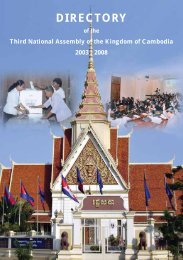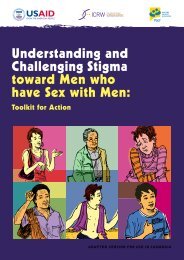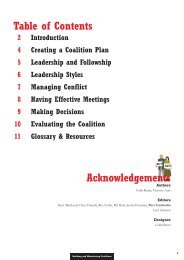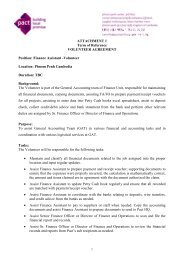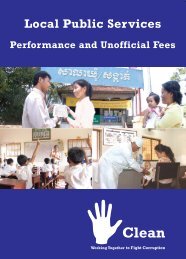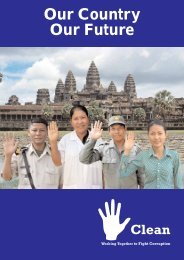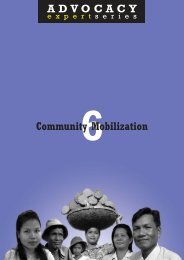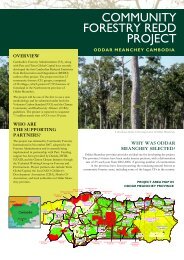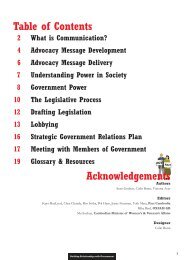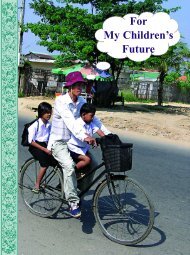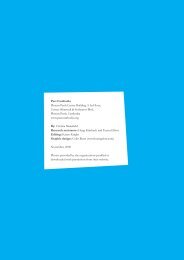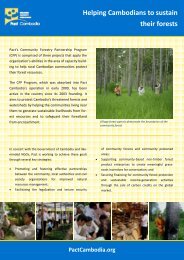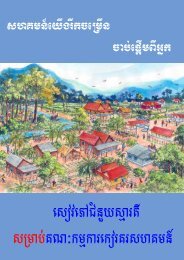Advocacy in Cambodia: Increasing Democratic ... - Pact Cambodia
Advocacy in Cambodia: Increasing Democratic ... - Pact Cambodia
Advocacy in Cambodia: Increasing Democratic ... - Pact Cambodia
Create successful ePaper yourself
Turn your PDF publications into a flip-book with our unique Google optimized e-Paper software.
Case Studies<br />
plan is a strategy for manag<strong>in</strong>g the<br />
fisheries sector <strong>in</strong> a susta<strong>in</strong>able<br />
way. A World Bank (WB)<br />
consultant drafted a fisheries law<br />
and, s<strong>in</strong>ce a World Bank<br />
agreement with the <strong>Cambodia</strong>n<br />
government <strong>in</strong>cludes a stipulation<br />
that the M<strong>in</strong>istry of Agriculture<br />
must conduct consultations with civil society on<br />
draft laws, the WB requested that the DoF<br />
nom<strong>in</strong>ate a qualified organization to conduct an<br />
<strong>in</strong>dependent public consultation.<br />
The DoF requested that the NGO Forum<br />
organize a consultation with civil society groups,<br />
with the stipulation that there would be no local<br />
representation as villagers tend to be affiliated<br />
with various political parties and would turn the<br />
consultation <strong>in</strong>to a series of criticisms. The DoF<br />
<strong>in</strong>dicated that it would prefer that NGOs organize<br />
their own separate forum and submit comments<br />
<strong>in</strong> writ<strong>in</strong>g. The DoF had $30,000 <strong>in</strong> loan funds<br />
available for the activity. However, the NGO<br />
Forum <strong>in</strong>dicated that its members were not will<strong>in</strong>g<br />
to use the loan funds, as this could compromise<br />
their ability to provide an <strong>in</strong>dependent<br />
perspective. The Department then approached<br />
Oxfam, which <strong>in</strong>dicated that as a matter of course<br />
it would have to <strong>in</strong>clude other NGOs <strong>in</strong> the<br />
consultation process. The consultation process<br />
appears to be on hold at present.<br />
After the Prime M<strong>in</strong>ister issued a warn<strong>in</strong>g <strong>in</strong><br />
late 2001, civil servants have become more<br />
cautious about attend<strong>in</strong>g and speak<strong>in</strong>g at NGO<br />
events. Because of this, when the local fisheries<br />
network organized a public forum <strong>in</strong> Kompong<br />
Thom, DoF and MoA officials decl<strong>in</strong>ed the<br />
<strong>in</strong>vitation to attend.<br />
As relations between NGOs and the<br />
Department of Fisheries have become stra<strong>in</strong>ed, a<br />
new coalition of agencies work<strong>in</strong>g on fisheries<br />
issues has been formed, the Fisheries Action<br />
Coalition Team (FACT). This coalition acts as an<br />
alternative negotiation channel to the NGO<br />
Forum.<br />
Impact of <strong>Advocacy</strong> Activities<br />
Accord<strong>in</strong>g to the literature, NGO<br />
identification of fisheries as a problem area was<br />
somewhat slow <strong>in</strong> com<strong>in</strong>g. This was probably the<br />
case because prior to the landlessness workshop,<br />
development workers had underestimated the<br />
importance of fisheries as a source of livelihood<br />
for rural populations. When fisheries disputes<br />
began to get serious however, NGOs at the national<br />
level reacted quickly to establish a fisheries<br />
network.<br />
Even when political will exists, the DoF does not have the means to<br />
implement policies, <strong>in</strong>clud<strong>in</strong>g the community fisheries program. Most<br />
disputes are not be<strong>in</strong>g solved and despite the pass<strong>in</strong>g of the sub-decrees<br />
releas<strong>in</strong>g concession lots, communities are not much closer to rega<strong>in</strong><strong>in</strong>g<br />
access to fish<strong>in</strong>g resources.<br />
Policy<br />
Substantial progress has been made with<br />
regard to the participation of affected<br />
communities and development actors <strong>in</strong> the<br />
shap<strong>in</strong>g of fisheries policies. Although the DoF has<br />
been reluctant to <strong>in</strong>clude these groups <strong>in</strong> the<br />
consultation process, important participation did<br />
take place with regard to draft<strong>in</strong>g the community<br />
fisheries sub-decree, which marked the first<br />
experience for development workers to advocate<br />
on fisheries legislation. Unfortunately, the most<br />
recent draft that has been circulated undoes much<br />
of the advocacy work that was done dur<strong>in</strong>g the<br />
consultation process. This suggests that fisheries<br />
lobbyists thought that the lobby<strong>in</strong>g process was<br />
complete once the DoF submitted the draft law to<br />
the M<strong>in</strong>istry. But lobbyists were unaware of the<br />
existence of a M<strong>in</strong>istry of Agriculture legal work<strong>in</strong>g<br />
group, and therefore never attempted to make<br />
contact with members of that group. This<br />
omission can be attributed to the lobbyists’ lack<br />
of experience <strong>in</strong> the sector, but it is expected that<br />
they will rally to request an explanation for the<br />
new changes and press for a return to the orig<strong>in</strong>al<br />
draft. This experience highlights a need for<br />
campaigners to better understand the legislative<br />
process. However, NGOs have s<strong>in</strong>ce learned that<br />
a faction with<strong>in</strong> the M<strong>in</strong>istry is champion<strong>in</strong>g the<br />
<strong>in</strong>clusion of NGOs <strong>in</strong> future discussions about the<br />
draft at the M<strong>in</strong>istry level, and this is reason to be<br />
optimistic about future consultation.<br />
Currently NGOs f<strong>in</strong>d themselves <strong>in</strong> an<br />
<strong>in</strong>terest<strong>in</strong>g position with regard to the draft<br />
fisheries law. World Bank stipulations require that<br />
the M<strong>in</strong>istry of Agriculture consult with civil<br />
society on draft laws, but NGOs are unwill<strong>in</strong>g to<br />
enter <strong>in</strong>to a consultation process that does not<br />
guarantee their <strong>in</strong>dependence and that is not<br />
perceived as be<strong>in</strong>g s<strong>in</strong>cere. It will be <strong>in</strong>terest<strong>in</strong>g to<br />
watch for the World Bank’s response to a letter<br />
sent by NGOs <strong>in</strong>dicat<strong>in</strong>g their position, especially<br />
because NGO leverage with the government<br />
regard<strong>in</strong>g fisheries depends to an extent on the<br />
World Bank’s <strong>in</strong>volvement. What is likely<br />
becom<strong>in</strong>g clear to those <strong>in</strong>volved at the M<strong>in</strong>istry<br />
of Agriculture is that NGOs are important to<br />
pass<strong>in</strong>g legislation and that legislation becomes<br />
more difficult to pass without popular <strong>in</strong>put.<br />
The one clear message that emerges from the<br />
50



